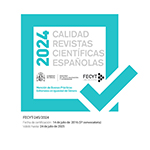The xenophobic language in the speech of teenagers on social networks. Analysis and work proposals in the Secondary Classroom
Abstract
The issue of racism in the classroom has been extensively addressed in recent years, but we consider that an exhaustive review of the role of social networks in its discursive reproduction among Spanish adolescents is necessary. As recent studies show, the rise of Spanish nationalist / patriotic sentiment runs parallel to the growth of fake news about migrants and xenophobic messages on social networks, which is especially worrying in the case of minors, who are much more permeable to manipulation. This article confirms the need to give room to values education in the classroom, implementing educational initiatives that specifically address hate speech to people of other races or from other countries. We propose to use the social network Twitter to work in class with real speeches about the immigration issue, in order to stimulate debate and the active participation of students in their learning process, guiding them in the detection of false news and discriminatory messages, so that they can have the necessary tools to build their identity within a framework of respect, inclusion and tolerance.
Downloads
Article download
License
In order to support the global exchange of knowledge, the journal Didáctica. Lengua y Literatura is allowing unrestricted access to its content as from its publication in this electronic edition, and as such it is an open-access journal. The originals published in this journal are the property of the Complutense University of Madrid and any reproduction thereof in full or in part must cite the source. All content is distributed under a Creative Commons Attribution 4.0 use and distribution licence (CC BY 4.0). This circumstance must be expressly stated in these terms where necessary. You can view the summary and the complete legal text of the licence.










